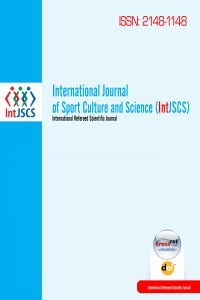Effect of Yoga and Aerobic Training on Bio Chemical Variables in Middle Aged Diabetic Patients
Diabetes is related to the impaired glucose tolerance of the body, where insulin functioning is affected. The beneficial effect of the practice of Yoga and other exercises like Aerobic Training on diabetes includes direct influence on pancreatic secretion by rejuvenation of the pancreatic cells, through alternate abdominal contractions and relaxations, during asana The purpose of the study was to find out the effects of yoga and Aerobic Training on selected biochemical variables blood sugar and Glucose Tolerance among diabetic patients. To achieve this purpose, sixty men patients who were not involved in any vigorous physical training programme, age ranging from 35 to 45, undergoing treatment for hypertension and type-II diabetes mellitus, were selected from in and around Pettai, Tirunelveli city. The selected subjects were divided into three groups at random with 20 each. Twenty patients in each category (type II Diabetes and Hypertension) would serve as control group and the remaining forty would undergo systematic Yoga training and Aerobic training in the department of physical education and sports sciences, under the supervision of physician, The M.D.T Hindu College, Tirunelveli. The control group did not undergo any special training programme. The remaining subjects constituted an experimental group who underwent Yoga and Aerobic Trainig Programme. The selected subjects were medically examined by a qualified medical person for undergoing the training programme Analysis of data using ANACOVA showed that there were significant difference between experimental groups and control group on selected variables blood sugar and oral glucose tolerance. The significant improvement in the above said variables highlights the effect of aerobic training and yoga training design for this study, its systematic progressive loading pattern and appropriate recovery phase between sessions during the training period. The control group did not participate any kind of training programme specifically for improving the selected variable
Keywords:
Yoga, aerobic training, blood sugar glucose tolerance,
___
- Ardy Fred Berg, The Facts on File Dictionary of Fitness, New York: Facts on File Publications, 1984.
- Boule NG et al., “Effects of exercise on glycemic control and body mass in type 2 diabetes mellitus: a meta-analysis of controlled clinical trials”, JAMA, Sep (2001) 12;286(10):1218-27.
- Brenner BM, et al. “Effects of losartan on renal and cardiovascular outcomes in patients with type 2 diabetes and nephropathy”. N Engl J Med; (2001), 345:861-9.
- Bruce CR et al., “Disassociation of muscle triglyceride content and insulin sensitivity after exercise training in patients with Type 2 diabetes”, Diabetologia, Jan(2004);47(1):23-30.
- Byrne, Keivn P., Understanding and Managing Cholesterol: A Guide for Wellness Professionals, Champaign, Illinois: Human Kinetics Books, 1991.
- Chapman MJ et al., “Raising high-density lipoprotein cholesterol with reduction of cardiovascular risk: the role of nicotinic acid--a position paper developed by the European Consensus Panel on HDL-C”. Curr Med Res Opin. Aug; (2004), 20(8):1253-68.Compact Oxford reference
- Dictionary, Oxford University Press, 2001 P 372
- D. R. Seals, J. M. Hagberg, W. K. Allen, B. F. Hurley, G. P. Dalsky, A. A. Ehsani, and J. O. Holloszy. “Glucose tolerance in young and older athletes and sedentary men”, Journal of Applied Physiology 56 (1984): 1521-1525.
- Fagard RH, Cornelissen VA. “Effect of exercise on blood pressure control in hypertensive patients”. Eur J Cardiovasa Prev Rehabil. Feb (2007), 14(1):12-7.
- Fenicchia LM et al., “Influence of resistance exercise training on glucose control in women with type 2 diabetes”, Metabolism, Mar(2004 ) 53(3):284-9.
- ISSN: 2148-1148
- Başlangıç: 2013
- Yayıncı: Uluslararası Bilim Kültür ve Spor Derneği (UBİKS)
Sayıdaki Diğer Makaleler
Ali Aziz Dawood AL SUDANI, Kamila BUDZYNSKA
Angela MAGNANINI, Pau Espinosa TRULL
Nikolay MOROZOV, Tatiana MOROZOVA
Moisés Diego GERMANO, Renê Scarpari De MATTOS, Márcio Antonio Gonsalves SINDORF, Paulo Henrique MARCHETTI, Rozangela VERLENGIA, Charles Ricardo LOPES, Gustavo Ribeiro Da MOTA, Alex Harley CRISP
Sport Education at Russian High Schools (from 18th to 21st century)
Elena KOMOVA, Sergey LITVINOV, Anna SKOTNIKOVA
Pasquale MOLITERNI, Gianni CAIONE
Optik Yanılsama ve Giysi Tasarımına Etkileri
Coaching Expertise: Science or Skills?
